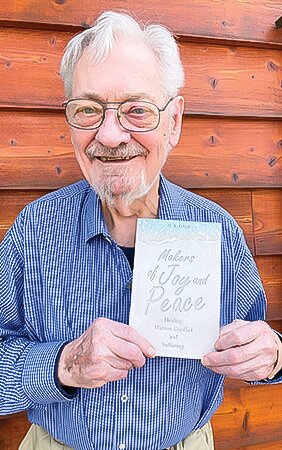Support the Timberjay by making a donation.
Retired pastor still preaching of peace and joy
SOUDAN- H. Arthur (Art) Dale has served as a Lutheran pastor in our area for decades, and now in his retirement, and at 93 years of age, he is continuing to pass on his vision through his second …
This item is available in full to subscribers.
Attention subscribers
To continue reading, you will need to either log in to your subscriber account, below, or purchase a new subscription.
Please log in to continue |
Retired pastor still preaching of peace and joy
SOUDAN- H. Arthur (Art) Dale has served as a Lutheran pastor in our area for decades, and now in his retirement, and at 93 years of age, he is continuing to pass on his vision through his second book, “Makers of Joy and Peace: Healing Human Conflict and Suffering.”
“The church is going down the hill,” said Dale, “and I think I have discovered why.”
Dale’s new book explores a path to reinvigorating Christian faith, by expanding the work of the church to enable more focus on the joy and peace of the gospels.
“The church doesn’t have an infrastructure that supports, number one, the proclamation of the good news of Jesus,” said Dale. “They made it into a doctrine. Something you have to believe, instead of absolutely out-of-this-world good news.”
“I speak as a Christian,” Dale writes in the introduction. “I hope that other believers will join with me in escaping the blame game and in searching for what we cannot see. If we blame, we can’t see. It is useless to blame our secular culture that gives authority to power and weapons. Nor can we fault the younger generations for their rejection of organized religion that has little influence.”
“The message of Jesus is ‘joy to the world’…but most Christians find little joy and peace in their daily lives.” The church has not focused on the search for joy and peace but on the forgiveness of human sin as the way to joy and peace.
Unfortunately, for many Christians, the gospel now means “the truth of God’s forgiveness” instead of an “expression of perfect joy.” As a result, the search for joy and peace has been left in the hands of advertising agencies and entrepreneurs who sell happiness in all its varieties, Dale writes.
“Sunday morning worship still does very important things,” he added, but said more is needed.
“I think we have to do three things,” Dale said. “We need to teach every member how to articulate the good news that can bring joy and peace to people. We need to teach the gospel the way it is in the New Testament. And we need to teach people how to listen.”
“If you don’t listen to someone,” Dale said, “you aren’t loving them.”
“Jesus proclaims the good news that God loves everyone, not just those who believe,” he said. “That means when I am talking to someone who is not a Christian, this is someone that God loves as much as God loves me.”
Dale said this approach builds on the already existing frameworks of Christian churches.
“The church is fighting against itself,” he said. “I want to reform the church by adding a focus on the cluster, where we can be ourselves in small groups, and not be afraid to say things.”
Dale proposes adding “a cluster-nourishing infrastructure to congregational life to keep all members loving one another and their Lord.” This includes staff that can train leaders in making joy and peace in Jesus’s name that provides healing knowledge and skills in the gospel, teaching skills for listening to one another, and skills to harmonize differences. It also includes creating fellowship programs, workshops, and retreats because time together grows relationships. A support system should also be developed to enable every member of a Christian congregation to make joy and peace.
“Makers of Joy and Peace: Healing Human Conflict and Suffering” is available online at both Amazon and Barnes and Noble, in paperback, hardcover, or kindle.






